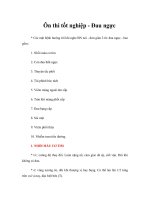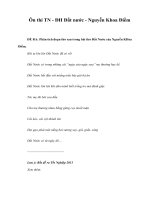Tài liệu ôn thi ngoại ngữ
Bạn đang xem bản rút gọn của tài liệu. Xem và tải ngay bản đầy đủ của tài liệu tại đây (325.32 KB, 49 trang )
NỘI DUNG HƯỚNG DẪN ÔN THI TUYỂN CCVC
CÁC ĐẠI TỪ
ĐTNX
TTSH
TN
ĐTSH
ĐTPT
I
my
me
mine
myself
You
your
you
yours
yourself
He
his
him
his
himself
She
her
her
hers
herself
It
its
it
its
itself
We
our
us
ours
ourselves
They
their
them
theirs
themselves
- đầu câu làm S
-trước N
- sau V
Thay TTSH+ N
John loves to look at himself in the
mirror
DANH TỪ
Danh từ đếm được
Danh từ khơng đếm được
- Có thể ở dạng ít hoặc số nhiều, chẳng hạn như: a day,
-Chỉ những gì khơng đếm được hoặc những gì có tính trừu
many days.
tượng: Money, water, coffee, work, weather, nature, furniture
-
Có thể theo sau một số đếm, a/an hoặc some (một
…
vài) hay any
- Khơng thể ở số nhiều.
-
Có thể theo sau some/ any.
Vd.
She has some money
She hasn’t got any money left now.
TRỢ ĐỘNG TỪ HÌNH THÁI
could,
may,
might,
should,
Must + V
have to,
Must + be + PII
will,
+ V
Must + have + PII
can,
shall,
Traffic rules must be observed
would,
at all times
ought to,
had better
must
LIÊN TỪ ĐẲNG LẬP (SONG SONG)
AND
She is a good and loyal wife.
BOTH ... AND
They learn both English and French.
AS WELL AS
He has experience as well as knownledge.
NO LESS THAN
You no less than he are very rich.
NOT ONLY ... BUT (ALSO)
He learns not only English but (also) Chinese.
OR
Hurry up, or you will be late.
EITHER … OR
He isn't either good or kind.
NEITHER ... NOR
She has neither husband nor children.
BUT
He is intelligent but very lazy.
THEN
The plant looks very faded; then it hasn't been watered for long.
CONSEQUENTLY
You didn't work hard for this term; consequently, he failed the exam.
HOWEVER
The discussion was short, However, we gained some new knowledge from it.
NEVERTHELESS
She studies very hard; nevertheless, she always gets bad marks.
STILL, YET
She says she does not love me, yet, I still love her.
OR, ELSE, OTHERWISE
Take the chance, otherwise you will regret it
LIÊN TỪ PHỤ THUỘC (CHÍNH PHỤ)
•
FOR
He will surely succeed, for (because) he works hard.
WHEREAS
He learns hard whereas his friends don't.
WHILE
Don't sing while you work.
BESIDES, MOREOVER
We have to study hard at school; besides, we must pay attention to physical
exercise.
SO
It rained very hard; so, we didn't go out that night.
HENCE
He came late; hence, he missed the first part of the lesson.
•
•
•
•
•
Mệnh đề trạng ngữ thời gian
•
AFTER
The ship was checked carefully after she had been built.
AS
They left as the bell rang.
AS SOON AS
They will get married as soon as they finish university.
BEFORE
Don't count your chickens before they are hatchd.
AS LONG AS
I will lend you some money as long as you promise to pay me back.
UNTIL
People do not know the value of health until they lose it.
WHEN
When you visit this country, you should bring thick winter clothes.
WHILE
When you rang, I was cleaning my bike.
•
•
•
•
•
•
•
Mệnh đề nơi chốn (Clause of place):
•
WHERE
The bed room is the best place where I do my homework.
•
WHEREVER
His mother follows him wherever he goes.
Mệnh đề thể cách (Clause of manner):
•
AS
Do as I told you to do.
•
AS IF
He talks as if he knew everything about her.
Mệnh đề so sánh (Clause of comparison
•
AS
He is as tall as his brother.
This bag is as expensive as that one.
Mệnh đề lý do (Clause of reason):
•
AS
As it rained very hard, we stopped the games.
•
BECAUSE
We could not pass the test because we didn't learn hard.
•
SINCE
I must go since she has telephoned three times.
Mệnh đề mục đích (Clause of purpose)
•
THAT
I work hard that I may succeed in life.
•
SO THAT
We went very early so that we could catch the last bus.
•
IN ORDER TO
We learn French in order to study in France.
Mệnh đề điều kiện (Clause of condition)
•
IF
If she doesn’t apologize , John will never speak to her again.
•
•
UNLESS (IF NOT)
You will be late unless you set off now.
PROVIDED THAT
You can enter the room provided that you have the ticket.
•
IN CASE
Please take a map with you in case (that) you may get lost.
Mệnh đề tương phản, trái ngược (Clause of contrast)
•
ALTHOUGH, THOUGH, EVEN THOUGH
Though/even though /although it rained hard, I went out with her.
•
AS
Rich as he is, he isn't ever happy.
•
EVEN IF
Even if my watch is right, we will be too late.
•
NOT WITH STANDING THAT
He is poor not with standing that he works very hard.
Articles (Mạo từ)
Mạo từ a, an được dùng trước các danh từ số ít, các danh từ lần đầu tiên được đề cập đến.
(Lưu ý: mạo từ an đứng trước các danh từ bắt đầu bằng một nguyên âm)
-
We have a cat and a dog.
Mạo từ the đứng trước các danh từ số ít, số nhiều, danh từ đếm được và danh từ không đếm
được khi danh từ ấy được nhắc lại lần thứ hai hoặc khi cả người nói lẫn người nghe đều biết về
khái niệm, sự vật, ý tưởng đề cập đến.
- We have a cat and a dog. The cat is old, but the dog is just a puppy.
MẠO TỪ A / AN ĐƯỢC SỬ DỤNG
•
trước danh từ chỉ nghề nghiệp
I’m a teacher. She’s an architect.
•
•
trong một số thành ngữ, cụm từ chỉ số lượng.
•
trong các câu cảm thán có cấu trúc: “ what + a + danh từ đếm được số ít”.
a pair of (một cặp), a couple of (một đơi), a few (một ít), a little (một ít), a great
deal of (nhiều), a great number of (nhiều) …
What a lovely day! (một ngày thật đẹp) What a pity! (thật tội nghiệp)
MẠO TỪ THE ĐƯỢC SỬ DỤNG
•
trước tên của các đại dương, sông, khách sạn, quán rượu, nhà hát, bảo tàng và
báo.
The Atlantic (Ấn Độ dương), the British Museum (bảo tàng Anh quốc)
The Times (nhật báo Thời đại), the Ritz (khách sạn Ritz)
•
trước các danh từ thể hiện sự duy nhất.
The sun (mặt trời – duy nhất trong thái dương hệ), the queen (nữ hoàng – duy nhất
trong một đất nước), the Government (chính phủ - duy nhất trong một quốc gia) …
•
trước so sánh cực cấp (so sánh nhất).
He’s the richest man in the world. Jane’s the oldest in the class.
KHƠNG SỬ DỤNG MẠO TỪ
•
trước các danh từ đề cập đến khái niệm chung chung.
I like potatoes. (khơng nói “I like the potatoes”)
•
trước tên riêng, tên các quốc gia, tỉnh lị, đường phố, ngơn ngữ, tạp chí, bữa ăn,
sân bay, nhà ga và núi.
I bought Cosmopolitan at Paddington Station. (Tôi đã mua tạp chí Cosmopolitan tại
ga Paddington),
•
trước một số nơi chốn hoặc trước các phương tiện giao thông (At home in/to
bed at/to work at/to school/university by bus by plane by car by train
on foot)
She goes to work by bus. (Cô ấy đi làm bằng xe bt)
•
trong câu cảm thán có cấu trúc “what + (tính từ) + danh từ khơng đếm được”.
What beautiful weather/ lound music! (thời tiết tuyệt quá/ Nhạc mở to quá), I
went home early
Giới từ chỉ thời gian/ nơi chốn
•
Prepositions of place (Giới từ nơi chốn): in, at, on, by, near...
•
Prepositions of time (Giới từ thời gian): in, at, on, before, after, till/until...
Phân biệt
Go to school
Go to the school
Go to church
Go to the church
......
.....
Adjectives (Tính từ)
• OF
WITH
• afraid of sợ, e ngại angry with giận giữ
• aware of nhận thức bored withchán
• capable of có khả năng busy with bận
• confident of tin tưởng crowded withđơng đúc
• full of đầy familiar with quen thuộc
• fond of thích fed up with chán
• proud of tự hào popular with phổ biến
•
• TO FOR
• accustomed to quen với available for có sẵn (cái gì)
• contrary totrái lại, đối lập difficult forkhó
• equal totương đương với late for trễ
• grateful to biết ơn ai famous for nổi tiếng
• harmful to có hại cho ai useful for có ích
• important to quan trọngready for sẵn sàng cho
.
•
•
•
•
•
•
•
sell st to sb bán cái gì cho ai responsible for chịu trách nhiệm
AT ABOUT
good at giỏi (về…)
confused about bối rối (về …)
bad at dở (về…) excited about hào hứng
upset about buồn
worried about lo lắng
IN FROM
interested in thích, quan tâm different from khác
rich in phong phú (về…) far fromxa
successful in thành công (về…) safe from an toàn
Adverds (Trạng từ)
•
•
•
•
Adverbs of manner (Trạng từ thể cách).
Adverds of frequency (Trạng từ tần suất)
Adverbs of degree (Trạng từ mức độ)
Sentence adverbs (Trạng từ câu): maybe, perhaps, luckily...
Comparisons of adjectives and adverbs (So sánh tính từ và trạng từ)
So sánh bằng
So sánh hơn
tính từ ngắn + ER + than
So sánh nhất
THE + tính từ ngắn + EST
As + adj / adv + as
MORE + tính từ dài + than
THE MOST + tính từ dài
A supermarket is much more convenient than a
market
LƯU Ý
* Tính từ ngắn là tính từ có một âm tiết như: hot, cold, sad… và tính từ có hai vần tận cùng bằng -ow, -et, -y, -er, -le như: narrow, quiet, happy,
clever, gentle…
* Tính từ dài là tính từ có hai, ba âm tiết trở lên như furious, important, polluted …
* Mơt số tính từ không theo quy tắc trên (so sánh bất quy tắc phải học thuôc long)
Good / well better
best
Bad / badly worse
worst
Far
furthest …
further
* So sánh hơn thường được chuyển thành so sánh không bằng hoặc ngược lại
Phrasal verbs (Cụm động từ):
catch up (with)
bắt kịp; theo kịp
cool off
lạnh đi; giảm đi
Go on
Vẫn còn
fill in
điền vào; ghi vào
get over
vượt qua; khắc phục
get up
thức dậy
give in
nhượng bộ;chịu thua
give up
bỏ; từ bỏ
go away
biến mất; tan đi
look after
Chăm sóc
This time last year they were going on dates and now they’re married
I get up at 6 a.m
I don’t know who can look after my children when I am on holiday
He is a very famous person. But he never spends so much money on
fashion.
spend... on
Dành... Cho...









